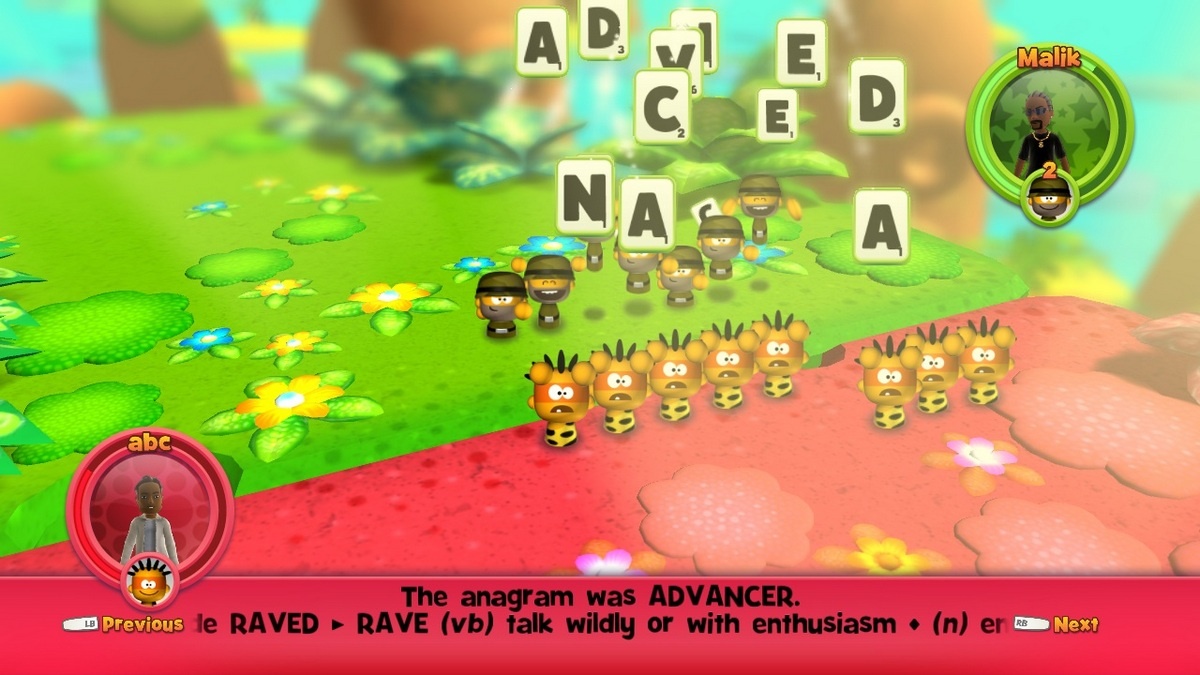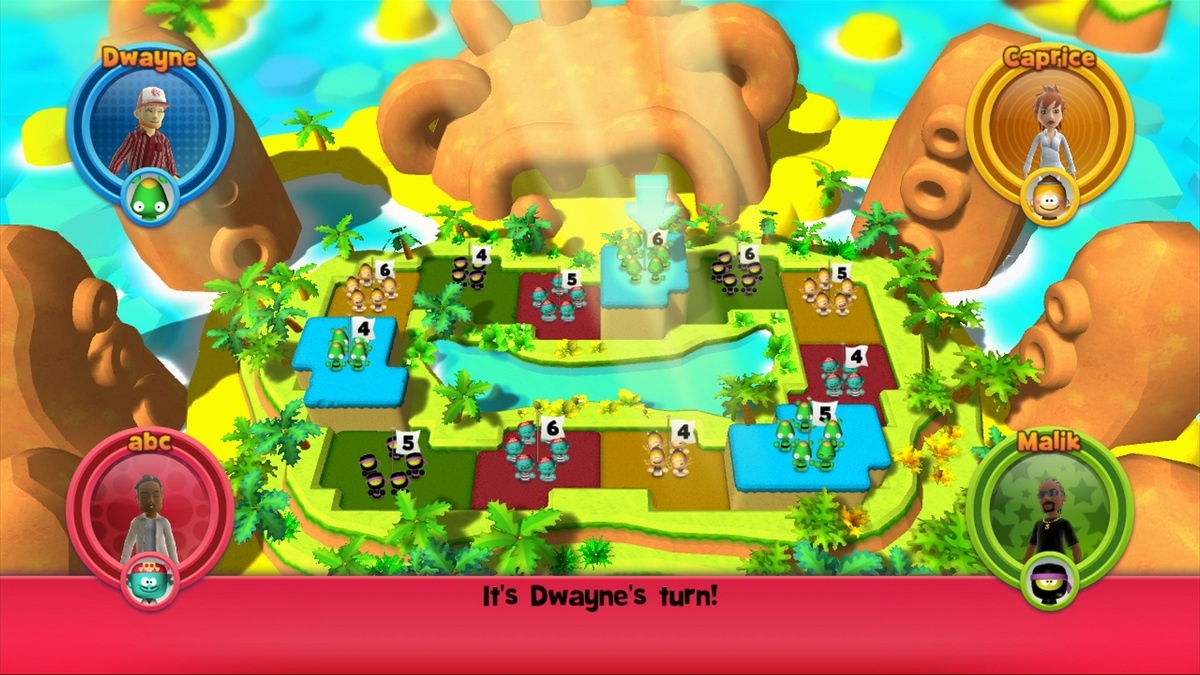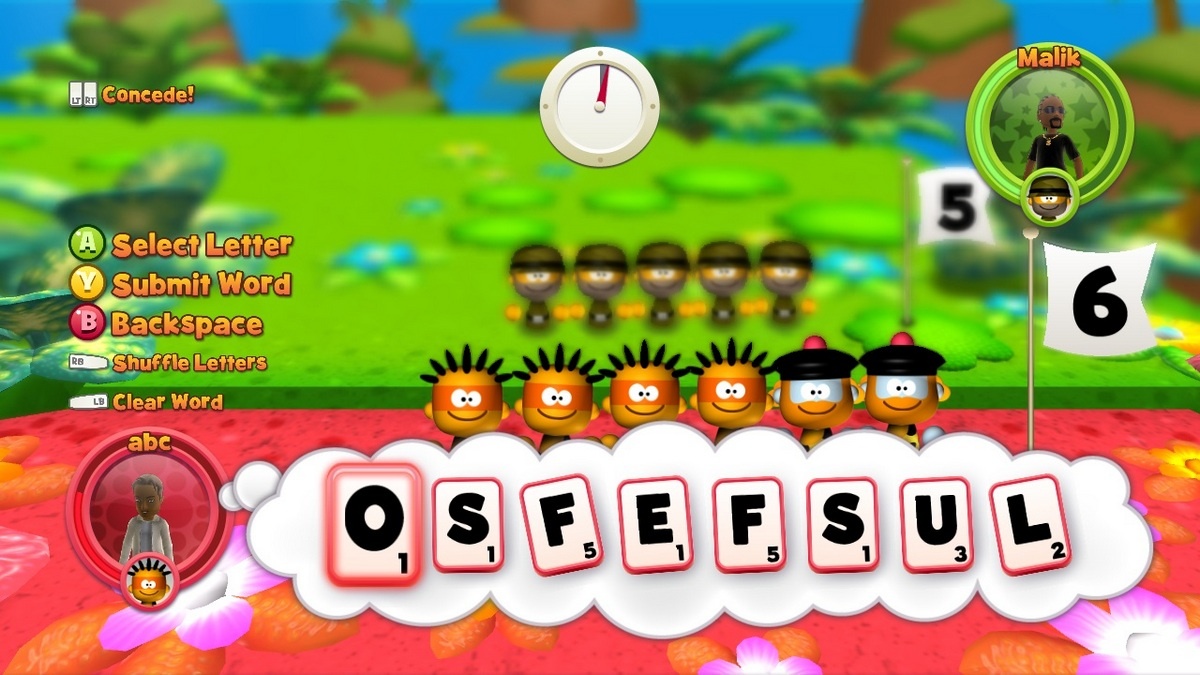Taking over the world through tactical force in the board game Risk is very different from dismantling your opponent through clever word usage in Scrabble, but what if these two seemingly disparate ideas could be combined into one game? Quarrel accomplishes that feat, and the result is a challenging Xbox Live game that proves to be addictive whether you're playing against fiendish computer opponents, dastardly friends, or cunning online strangers. Though Quarrel was originally released for the iOS last year, don't be fooled into thinking this a shallow mobile experience. Rather, with a few substantial tweaks and additions, Quarrel offers an experience that more than lives up to console-sized expectations.

Like Risk, Quarrel involves moving troops from territory to territory. However, battles aren't decided with simple dice rolls. Instead, crafting words is the key to victory. In a broad sense, your goal is to win battles by plucking high-scoring words out of an eight-letter set that you are dealt when opposing forces collide. If you win enough battles and move your troops effectively, you can take over maps in much the same manner as you would if you were playing a round of Risk. But winning fights is much more rewarding in Quarrel than in that other game of world conquest because luck doesn't factor in. Instead, your wits and your vocabulary determine who rules the world and who spends their dark days pouring over unabridged dictionaries.
Though the core concept is simple, Quarrel adds some interesting twists that keep matches tense for the duration. Even if you see a lengthy word that you might like to play, for example, you can't always enter it because you need a soldier for each letter, and the more units you commit to a fight, the more of them you stand to lose if you're defeated. Some letters yield more points than others. If you have an eight-unit army, then, of course, your goal is to go for the eight-letter anagram, but typically, both you and your opponent will have more like four or five soldiers. Or you may even find yourself at a severe disadvantage while defending against a rival who is tearing across the battlefield. In such cases, the victor is typically the person who remains calm. A four-letter word like "quay" can easily beat a six-letter play if the circumstances are favorable.
Up to four people can play Quarrel at once, but no single battle directly involves more than two players. Fortunately, if you are watching from the sidelines, you still have plenty of reason to pay attention even when you're not in battle. While your opponents are going head-to-head, you can try your own hand at solving the same puzzle. You score points that slowly fill your meter so that you can eventually call in a reserve unit, or you can try to solve the eight-letter anagram and instantly gain another ally. That setup cleverly eliminates downtime in a game where a single extra unit can eventually mean the difference between a 10-point play and a 25-point play. The stakes are high enough that any mistake you make and any opportunity that you fail to seize could be the one that costs you the war.

Unfortunately, there are instances when it feels like the game is cheating you out of a hard-earned victory. You'll likely want to play every round online when possible, so that at least if you lose, you know that the loss was your own fault and not a fluke. Playing with rivals who have the same human limitations as you is invigorating, and it's easy to customize a match to your liking. Sadly, the lack of a local multiplayer mode means that you sometimes have no choice but to challenge the computer.
Once you do settle on the computer as your opponent, at least you have several options. There's a helpful tutorial mode that walks you through the game and gives some good tips that you'd do well to keep in mind. You can also create a custom game and strip away the timer if you want. Otherwise, your choices are the Challenges, Domination, and Showdown modes. Each variation contains between 10 and 12 unique events. The earliest of those events feature rivals that tend to take a long time to settle on words. They also miss a lot of the trickier plays that could cut a battle short, so it's not especially difficult to clear the initial few maps. However, later opponents can be proper nuisances. Some of the final characters barely ever miss an eight-letter anagram, and they usually settle on their choices before the timer has ticked halfway down, meaning you must play a nearly perfect game to come out ahead.
A perfect game is not a frequent accomplishment, either, thanks to an awkward interface and a temperamental lexicon. The game supports the keypad accessory, and an icon appears on character profiles to let you know which online opponents are equipped with one. Lacking one of those, your best options are the analog stick and bumper buttons. Entering a word can take a few seconds, and that eats away at valuable time you might otherwise spend spotting anagrams. Text appears onscreen to congratulate you if you can move your fingers with particular dexterity, but even the fastest movement isn't always enough.

Another issue is that there are some downright strange anagrams. You sometimes find simple words like "reserved" and "homeless," but other times, you're expected to know such words as "ameerate," "dakerhen," or "khazenim." A lot of the possible anagrams seem like pure balderdash, particularly some of the ones that seem to have been made up, such as "gluepots" or "brainbox." Failing because you ran into an obscure eight-letter anagram is frustrating. You are allowed a few guesses, which lets you play around a bit, but each second you spend experimenting takes you closer to a loss in the event of a tie. The game breaks ties by awarding victory to the person or computer opponent that entered a word first.
If you can tolerate its quirks, Quarrel has a lot going for it. Computer opponents may seem like virtuosos at times, but that only means that you have to invest some substantial time before you can earn gold rankings and achievements upon completing the most trying events. The production values are also quite high; playing fields are presented in vibrant primary colors and the battles between troops are well animated. Warriors in various garbs square off and hurl letters at one another. Captives march grimly with their captors on the return trip to camp. Explosions leave some soldiers briefly blackened before they float skyward with halos overhead. Vocal combatants squeak and grunt while cheery military tunes keep your head in the game. The general proceedings are reminiscent of the Worms series.
Despite its flaws, Quarrel offers a robust experience for puzzle enthusiasts and wordsmiths alike, and at a cost of just 400 Microsoft points ($5.00), you're sure to get your money's worth. It's a welcome relief from more standard fare and a good way to keep your gray matter in shape.